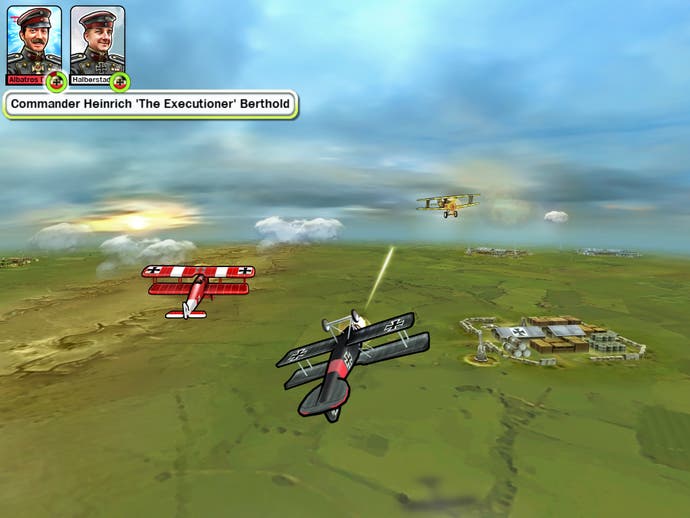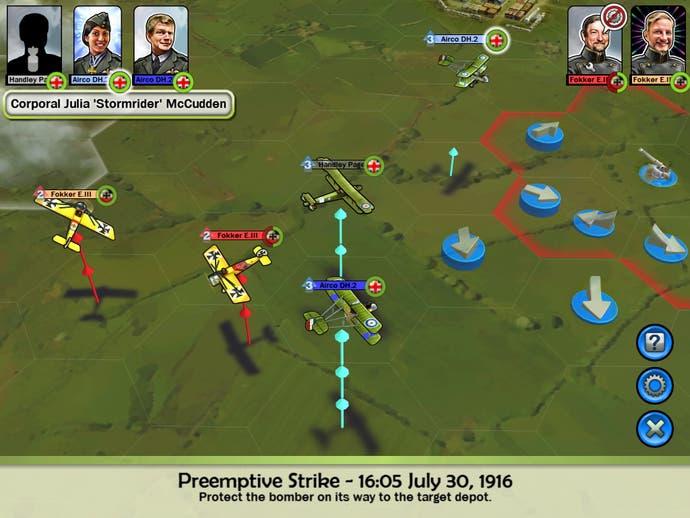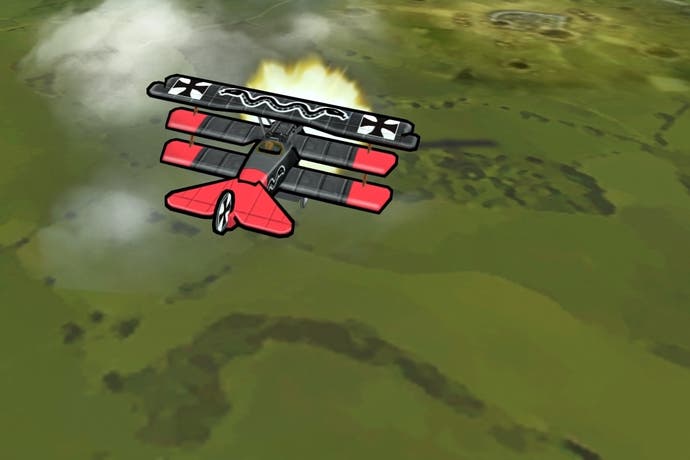Ace Patrol preview: Sid Meier takes to the skies
"I love the game design part most of all."
In World War 1, when a flying ace had an enemy on their tail, it was perfectly acceptable practice for them to pull off a manoeuvre known as the falling leaf. They'd shut off the engine, tumble from the sky, and then restart everything when they were safely out of range of enemy gunfire. Voila! Such a crazed, desperate piece of thinking serves as a vivid reminder of why this tiny, lurid slice of aviation history was both so deadly and so fascinating. In the hands of an experienced designer, it's also an indicator of how rich the period is as the foundation for a turn-based strategy game.
And so, fairly early on in Sid Meier's Ace Patrol, you'll be able to unlock the falling leaf, a risk/reward evasion move that allows you to rapidly lose height, but will also randomise the direction it leaves you facing in. It turns out to be a brilliant addition to a game in which positioning is everything, and where a small selection of units can create battles of real tension and unpredictability.
It really is Sid Meier's Ace Patrol, too. The legendary Civilization creator's led a small team on the project at Firaxis, and he's been handling everything from basic game design through to coding. "I love designing games, but I also enjoy the programming part," he tells me when we sit down with the game in a conference room. "On these smaller projects I get to do a bigger portion of that - the game rules, the AI and stuff. It's fun for me, and it also means that a lot more of what I create ends up in the final game rather than going through various iterations and things like that. We had three engineers on the project - I was one of them and we had two other engineers. A nice tight compact team, and we had a lot of fun making it."

It's not hard to see why. Ace Patrol's the perfect strategy adventure for a morning commute, and while its missions are short, they're filled with barnstorming action as you throw your planes around the sky and tackle everything from basic dog-fighting to raids on blimps or supply trains. Unlike games such as SteamBirds, which you control by dragging an arrow in the direction you want to fly, Ace Patrol's arenas are divided into hexes: your available moves are presented to you as little 3D buttons that you can tap once for a preview and twice to select, and this makes everything from turning to looping to shifting altitude easy to comprehend.
But wait - hexes in the sky? "That was the first thing we prototyped, the hex-based movement system. That's got to be fun or nothing else really matters," explains Meier. "Sure, it's a non-intuitive way of looking at flying, but what we found with turn-based games like this is that it allows your mind to roam around in that area. In Civ you're going to take a turn but you're going to imagine all the consequences of what you're doing, and we wanted that here, too - for you to put yourself in the pilot's cockpit, and think, 'well, if I turn left here I could sneak over to that cloud and then...' You're using your imagination to bring the whole game to life."
In between battles, a deeper layer of strategy awaits as you unlock new planes and bolt on additional kit, pick pilots - each of whom comes with their own perks and abilities - and select wingmen to join you in battle. Level your team up, and you get to choose from a range of extra moves for them to learn, too - another little treat, another decision that leaves you wondering, what if...? Meanwhile, the whole game's presented with an efficient and chunky cel-shaded art style, and the voice work is performed by Firaxis staff - the perfect element of scrappy charm to counterpoint Ace Patrol's confident design.

It's a modest game, then, but one that Meier's clearly extremely pleased with. Along with Haunted Hollow, it's a nice opportunity for the studio to dip its toe into the waters of the App Store - the excellent Civ Revolution port was handled by 2K China - and it's a chance for the designer to get back to his roots a little. "I like to iterate," he says. "To try something straight away and then change it, and we had an environment where that was really possible. Kind of like the good old days, when we just made games and there weren't a bunch of other things we had to do to get the games out. I love the game design part most of all - and with these games you can do just as much game design as in a triple-A game, but you're getting it done in a year as opposed to a couple of years."
This article is based on a press trip to Firaxis' offices in Maryland, USA. 2K Games paid for travel and accommodation.

